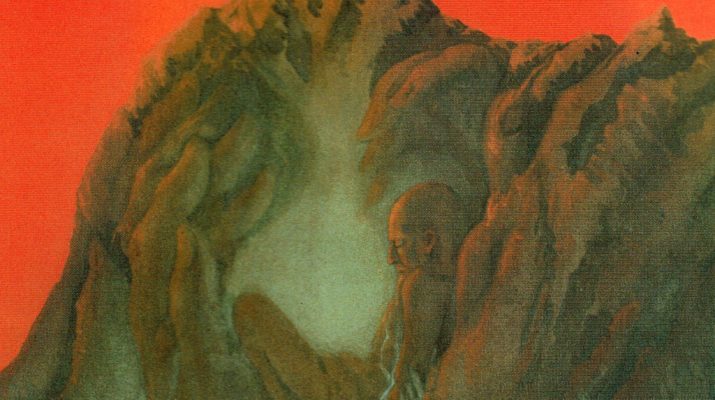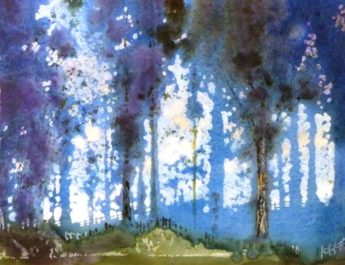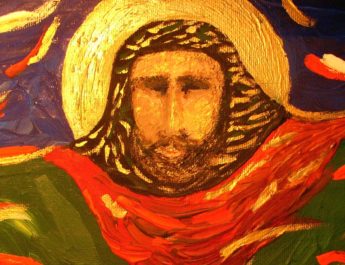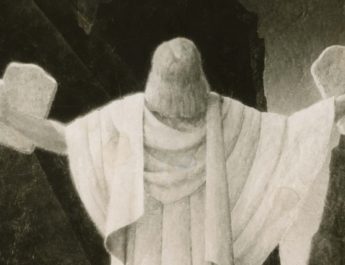Deuteronomy 34:1-12
Proper 25A
1 Then MosesI went upII from the plainsIII of MoabIV
I “Moses” = Mosheh. From mashah (to pull out in a literal or figurative sense, to draw out) OR from Egyptian mes or mesu (child, son i.e. child of…). This is Moses – the one drawn out from the water, which is to say, rescued. If derived from the Egyptian, his name would share a root with Rameses and Thutmose.
II “went up” = alah. This is to go up, approach, ascend, be high, be a priority; to arise in a literal or figurative sense.
III “plains” = arabah. From the same as arab (desert plateau, Arabia) OR from arab (to become evening); {from ereb (evening) or from arab (to exchange, give or take on pledge, braid, intermix)}. This is a desert valley or plain, wilderness. Also, the name of a place Arabah.
IV “Moab” = Moab. May be from ab (father, ancestor, grandfather; father in a literal or figurative sense). This is Moab or Moabite. Name could mean “from her father” in reference to the incestuous relationship between Lot and his daughters. The name could also mean, more pleasantly, “seed of a father” or “desirable land.” See https://en.wikipedia.org/wiki/Moab
to MountV Nebo,VI to the topVII of Pisgah,VIII
V “Mount” = har. From harar (hill or mountain). This is mountain, hill, hilly region.
VI “Nebo” = Nebo. 13x in OT. From Akkadian nabu (to prophesy, announce); related to Hebrew nabi (prophet) and nabah (to be important or high). This is Nebo – the name of a city and mountain in Moab. It is also a Babylonian god of wisdom and the god of the scribes. The name likely means foreteller or height. See https://www.abarim-publications.com/Meaning/Nebo.html#.X1QWdMhKhPY
VII “top” = rosh. This may come a word that means to shake. It is the head, captain, or chief. It can also be excellent or the forefront. It can be first in position or in statue or in time (i.e. the beginning).
VIII “Pisgah” = Pisgah. 8x in OT. From pasag (to go between, pass through; figuratively to contemplate or consider). This is Pisgah, meaning cleft. It is a mountain in Moab.
which is oppositeIX Jericho,X and the LordXI showedXII him
IX “opposite” = paneh. From panah (to turn, face, appear). This is face in a literal or figurative sense. It could be face, presence, anger, respect. It can also be used of God to indicate divine favor or presence.
X “Jericho” = Yericho. From yareach (moon); {from the same as yerach (month)} OR from ruach (smell, breathe, perceive, anticipate, accept, enjoy). This is Jericho meaning either “moon city” or “fragrant place.”
XI “Lord” = YHVH. From havah (to be, become) or hayah (to come to pass, become, be). This is the name of the God of Israel, the self-existent and eternal one, the tetragrammaton. This pronunciation has been lost to time so “Lord” is generally used in its place.
XII “showed” = raah. This is to see in a literal or figurative sense so stare, advise, think, view.
the wholeXIII land:XIV GileadXV as far as Dan,XVI
XIII “whole” = kol. From kalal (to complete). This is all or every.
XIV “lands” = erets. Root may mean to be firm. This is earth, ground, field land, or country.
XV “Gilead” = Gilad. From gala (to lay bare, quarrel, expose) OR from gal’ed (heap of testimony); {from gal (wave, billow, rock pile; something rolled; a spring of water); {from galal (to roll, roll away, wallow, commit, remove; rolling in a literal or figurative sense)} + ed (witness, testimony, recorder); from ud (to admonish, repeat, duplicate, testify, restore, record, relieve)}}. This is Gilead, meaning “perpetual fountain” or “heap of testimony.” See https://www.abarim-publications.com/Meaning/Gilead.html#.Xw_EFShKhPY.
XVI “Dan” = Dan. From din (to judge, defend, dispute, govern, quarrel, plead). This is Dan or a Danite. It means “judge” and can refer to Dan, his tribe, or the lands of the tribe.
2 allXVII Naphtali,XVIII the land of EphraimXIX and Manasseh,XX
XVII “all” = kol. Same as “whole” in v1. See note XIII above.
XVIII “Naphtali” = Naphtali. From pathal (to twist, twine, wrestle, struggle, behave in an unsavory way). This is Naphtali, meaning “my wrestling.” It can refer to Naphtali, his tribe, or the lands of the tribe.
XIX “Ephraim” = Ephrayim. From the same as epher (ashes or dust – properly something strewn) OR from parah (to grow, increase, be fruitful in a literal or figurative sense). This is Ephraim, one of Joseph’s sons, his descendants, and their land.
XX “Manasseh” = Menashsheh. From nashah (to forget, neglect, remove, deprive). This is Manasseh, literally “causing to forget.” It is Manasseh, his tribe, or the lands of the tribe.
all the land of JudahXXI as far as the WesternXXII Sea,XXIII 3 the Negeb,XXIV and the PlainXXV—
XXI “Judah” = Yehudah. Probably from yadah (to throw one’s hands into the air in a gesture of praise); from yad (hand). This is Judah, meaning “praised.”
XXII “Western” = acharon. From achar (to be behind, delay, be late, procrastinate, continue). This is end, last, coming behind, to loiter, later. It can also refer to the west.
XXIII “Sea” = yam. Root may mean to roar. This is the sea, often referring to the Mediterranean. It comes from the root in the sense of the roar of crashing surf. This word is sometimes used for rivers or other sources of water. It can mean to the west or to the south.
XXIV “Negeb” = Negeb. Root may mean to be parched. The Negeb is the south country – sometimes used to refer to Egypt. This is a land that suffers from a lot of drought.
XXV “Plain” = Kikkar. From karar (to dance or whirl). This is round so it can refer to a circle, a circular region, a weight used for measurement, money, a loaf of bread that is round, a cover, a plain, or a valley in the Jordan.
that is, the valleyXXVI of Jericho, the cityXXVII of palm treesXXVIII—as far as Zoar.XXIX
XXVI “valley” = biqah. From baqa (to divide, split open, tear, breach, break open, dash to pieces). This is a valley or plain. Properly, it refers to a place where the mountains have split – a wide, flat valley between them.
XXVII “city” = iyr. From uwr (to awaken or wake oneself up). This can mean excitement in the sense of wakefulness or city. Properly, this is a place that is guarded. Guards kept schedules according to watches. This sense of the word would include cities as well as encampments or posts that were guarded.
XXVIII “palm trees” = tamar. 12x in OT. From the same as tomer (palm tree, the trunk of that tree, a post). The root may mean being erect. This is a date palm or other palm tree. This is also the root of Tamar’s name in the Bible.
XXIX “Zoar” = Tsoar. 10x in OT. From tsaar (to be brought low, small, little one; figuratively, be insignificant or ignoble). This is Zoar or Tsoar, a city whose name means “insignificance” or “little.”
4 The Lord said to him, “This is the land of which I sworeXXX to Abraham,XXXI to Isaac,XXXII
XXX “swore” = shaba. Perhaps from sheba (seven – the number of perfection/sacred fullness). This is to swear, curse, vow, make a covenant. Properly, it can mean to be complete. This is to seven oneself – as in affirming something so strongly it is as though it were said seven times.
XXXI “Abraham” = Abraham. Related to “Moab” in v1. From the same as Abiram (exalted father, a high father – lofty) {from ab (see note IV above) + rum (rise, bring up, being high, extol, exalt, haughty; to raise in a literal or figurative sense)}. This is Abraham, father of many nations or father of a multitude.
XXXII “Isaac” = Yitschaq. From tsachaq (to laugh, mock, play, make sport; this is laughing out loud whether in joy or in a scornful way). This is Isaac, meaning “he laughs.”
and to Jacob,XXXIII saying, ‘I will giveXXXIV it to your descendants.’XXXV
XXXIII “Jacob” = Yaaqob. From the same as aqeb (heel, hind part, hoof, rear guard of an army, one who lies in wait, usurper). This is Isaac’s son and his descendants. The name means heel-catcher or supplanter.
XXXIV “give” = natan. This is to give, put, set, offer. It is to give literally or figuratively.
XXXV “descendants” = zera. From zara (to sow or scatter seed; conceive or yield). This is seed or sowing. It can, thus, mean a fruit, plant, sowing time, child, offspring, or posterity.
I have let you seeXXXVI it with your eyes,XXXVII but you shall not cross overXXXVIII there.”
XXXVI “see” = raah. Same as “showed” in v1. See note XII above.
XXXVII “eyes” = ayin. This is eye in a literal or figurative sense so eye, appearance, favor, or a fountain (the eye of the landscape).
XXXVIII “cross over” = abar. This is to pass over or cross over. It is used for transitions, whether literal or figurative. It can also mean to escape, alienate, or fail. This is the root verb from which “Hebrew” is drawn.
5 Then Moses, the servantXXXIX of the Lord, diedXL there in the land of Moab, at the Lord’s command.XLI 6 He buriedXLII him in a valleyXLIII in the land of Moab,
XXXIX “servant” = ebed. From abad (to work, serve, compel; any kind of work; used causatively, can mean to enslave or keep in bondage). This is a servant, slave, or bondservant.
XL “died” = mut. This is to die in a literal or figurative sense. It can also refer to being a dead body.
XLI “command” = peh. This is mouth in a literal or figurative sense. So, more literally, it can be beak or jaws. More figuratively, it refers to speech, commands, or promises.
XLII “buried” = qabar. This is to bury or inter. It could also refer to the person who does the burying.
XLIII “valley” = gay. Perhaps from the same as gevah (pride, confidence); from gevah (the back or body); from gey (the back, among); from ga’ah (to grow up, rise, triumph, be majestic). This is valley or gorge that has high walls. It is, perhaps, a narrow valley, but not a winter-torrent.
oppositeXLIV Beth-peor,XLV but no oneXLVI knowsXLVII his burial placeXLVIII to this day.XLIX
XLIV “opposite” = mul. Perhaps from mul (to cut short, circumcise, blunt, destroy). This is in front of, opposite, with, abrupt. Literally, it refers to some kind of precipice.
XLV “Beth-peor” = Beth peor. 4x in OT. From bayit (house, court, family, palace, temple); {from banah (to build)} + Peor (Peor – a mountain in Moab and a god of Moab; perhaps meaning gap); {from paar (to gape, yawn; open wide – especially the mouth – in a literal or figurative sense)}. This is Beth-Peor, meaning House of Peor.
XLVI “one” = ish. Perhaps from enosh (human, humankind, mortal); from anash (to be weak, sick, or frail). This is man, husband, another, or humankind.
XLVII “knows” = yada. This is to know, acknowledge, advise, answer, be aware, be acquainted with. Properly, this is to figure something out by seeing. It includes ideas of observation, recognition, and care about something. It can be used causatively for instruction, designation, and punishment.
XLVIII “burial place” = qeburah. Related to “buried” in v6. 14x in OT. From qabar (see note XLII above). This is grave or burial.
XLIX “day” = yom. Root may mean being hot. This is the day in a literal or figurative sense. It can also mean birth, age, daylight, continually or other references to time.
7 Moses was one hundredL twentyLI yearsLII oldLIII when he died;LIV
L “hundred” = meah. This is hundred or some number times one hundred (i.e. hundredfold or the base of two hundred, three hundred, etc.).
LI “twenty” = esrim. From the same as eser (ten, tenth). This is twenty or twentieth.
LII “years” = shanah. From shana (to change, alter). This is a year, age, old. It can also mean yearly.
LIII “old” = ben. Related to “Beth-peor” in v6. From banah (see note XLV above). This is son, age, child. It is son in a literal or figurative sense.
LIV “died” = mavet. Related to “died” in v5. From muth (see note XL above). This can be death, deadliness, the dead, or the place where the dead go. It can be used figuratively for pestilence or ruin.
his sightLV was unimpaired,LVI and his vigorLVII had not abated.LVIII
LV “sight” = ayin. Same as “eyes” in v4. See note XXXVII above.
LVI “unimpaired” = lo + kahah. Kahah is 8x in OT. This is to darken, grow faint, fail, be weak, have one’s eye dim or become dull.
LVII “vigor” = leach. 1x in OT. From the same as lach (fresh, green, moist; root may mean to be new). This is moisture, freshness, or vigor.
LVIII “abated” = nus. This is to flee, vanish away, hide, escape, be displayed.
8 The IsraelitesLIX weptLX for Moses in the plains of Moab thirtyLXI days;
LIX “Israelites” = ben + Yisrael. Literally “children of Israel.” Ben is the same as “old” in v7. See note LIII above. Yisrael is from sarah (to persist, exert oneself, contend, persevere, wrestle, prevail) + El (God or god). This is Israel, meaning God strives or one who strives with God; new name for Jacob and for his offspring. This refers to the people and to the land.
LX “wept” = bakah. This is to weep, complain, or lament.
LXI “thirty” = sheloshim. From the same as shalosh (three, fork, triad). This is thirty or thirtieth.
then the periodLXII of mourningLXIII for Moses was ended.LXIV
LXII “period” = yom. Same as “day” in v6. See note XLIX above.
LXIII “mourning” = ebel. From abal (to mourn, bewail). This is mourning or lamentation.
LXIV “was ended” = tamam. This is to finish or accomplish. It is to make perfect, demonstrate that you are upright, consume or cease. It is to complete in a literal or figurative sense, positive or negative.
9 JoshuaLXV sonLXVI of NunLXVII
LXV “Joshua” = Yehoshua. Related to “Lord” in v1. From YHVH (see note XI above) + yasha (to deliver, defend, help, preserve, rescue; properly, to be open, wide or free, which implies being safe. So, in a causative sense, this is to free someone). This is Joshua, Jeshua, or Yehoshua, which means “the Lord is salvation.”
LXVI “son” = ben. Same as “old” in v7. See note LIII above.
LXVII “Nun” = Nun. From nun (to propagate, continue, resprout, be perpetual). This is Nun or Non, meaning “perpetuity.”
was fullLXVIII of the spiritLXIX of wisdomLXX
LXVIII “full” = male. From male (fill, satisfy, replenish, accomplish, fulfill, confirm, or consecrate; fill in a literal or figurative sense). This is full in a literal or figurative sense. It can also mean filling or pregnant.
LXIX “spirit” = ruach. This is breath, wind, air, cool, spirit. This is wind, which resembles the breath and so this can be used figuratively for life itself or being frail/mortal/impermanent. It can refer to the air of the sky or the spirit.
LXX “wisdom” = chokmah. From chakam (to be wise or teach wisdom; this is wisdom in thought, word, or action). This is wisdom, wit, or skillfulness.
because Moses had laidLXXI his handsLXXII on him, and the Israelites obeyedLXXIII him, doingLXXIV as the Lord had commandedLXXV Moses.
LXXI “laid” = samak. This is to lean, rest, support, brace, uphold, sustain, or establish. It is to lean on in a positive or negative sense.
LXXII “hands” = yad. This is hand, ability, power. Hand in a literal sense, but also what one can do or the means by which one does it.
LXXIII “obeyed” = shama. This is to hear, call, consent, or consider. It implies listening intelligently, giving attention, and, because of these two factors, obedience and action are often implied.
LXXIV “doing” = asah. This is to make, do, act, appoint, become in many senses.
LXXV “commanded” = tsavah. This is to charge, command, order, appoint, or enjoin. This is the root that the Hebrew word for “commandment” comes from (mitsvah).
10 Never since has there arisenLXXVI a prophetLXXVII in Israel like Moses, whom the LordLXXVIII knew faceLXXIX to face.
LXXVI “arisen” = qum. To arise, stand, accomplish, establish, abide. This is rising as in rising against, getting up after being sick or asleep, arising from one state to another, becoming powerful, or rising for action. It can also be standing in a figurative sense.
LXXVII “prophet” = nabi. Related to “Nebo” in v1. See note VI above.
LXXVIII “Lord” = YHVH. Related to “Lord” in v1 & “Joshua” in v9. From the same as YHVH (see note XI above). This is a secondary spelling of the Lord, the name of the God of Israel. It has the same meaning.
LXXIX “face” = paneh. Same as “opposite” in v1. See note IX above.
11 He was unequaled for all the signsLXXX and wondersLXXXI that the LordLXXXII sentLXXXIII him
LXXX “signs” = ot. From avah (to mark, sign, point out); OR from uth (to agree). This is a sign in a literal or figurative sense. It could be a flag or monument. It could be evidence or a mark. It could also be an omen or a miracle.
LXXXI “wonders” = mopheth. Perhaps from yaphah (to be beautiful, decorate; root means being bright, which implies being beautiful). This is a wonder, miracle, symbol, sign, or omen.
LXXXII “Lord” = YHVH. Same as “Lord” in v1. See note XI above.
LXXXIII “sent” = shalach. This is to send out, away, send for, forsake. It can also mean to divorce or set a slave free.
to performLXXXIV in the land of Egypt,LXXXV against PharaohLXXXVI and all his servants and his entireLXXXVII land,
LXXXIV “perform” = asah. Same as “doing” in v9. See note LXXIV above.
LXXXV “Egypt” = Mitsrayim. Perhaps from matsor (besieged or fortified place, bulwark, entrenchment; something hemmed in; a siege or distress or fastness); from tsur (to confine, besiege, to cramp). This is Egypt.
LXXXVI “Pharaoh” = Paroh. From Egyptian pr (palace, pharaoh; literally house + great). This is Pharaoh, a title for Egyptian kings. See https://en.wiktionary.org/wiki/pharaoh
LXXXVII “entire” = kol. Same as “whole” in v1. See note XIII above.
12 and for all the mightyLXXXVIII deedsLXXXIX and all the terrifyingXC displays of powerXCI that Moses performed in the sight of all Israel.
LXXXVIII “mighty” = chazaq. From chazaq (to strengthen, seize, be courageous, repair, bind, heal, conquer, harden). This is strong, hard, powerful, loud, bold, violent, impudent. It is usually strong in a negative sense.
LXXXIX “deeds” = yad. Same as “hands” in v9. See note LXXII above.
XC “terrifying” = mora. 12x in OT. From yare (to fear, be afraid, dreadful; fearful reverence – to fear in a moral sense is to say to revere, respect.). This is fear, dread, respect, or reverence. It can also be a fearful thing or action.
XCI “displays of power” = gadol. From gadal (to grow up, become great, become wealthy – to advance. The root meaning may be to twist in the sense of the process of growing). This is great, high, bigger, noble, old, marvelous. It can also refer to someone who is powerful or distinguished.
Image credit: “Death of Moses” by Frank Wesley.




